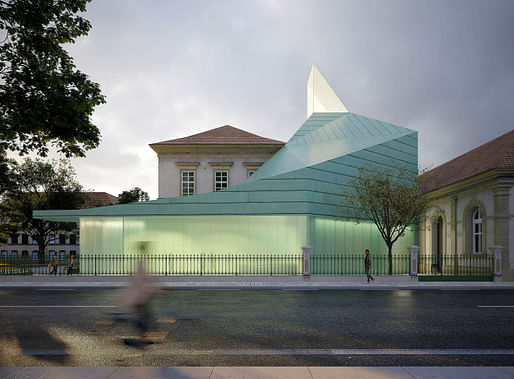
Last month, Archinect spoke with three firms that hold a track record of securing international commissions beyond their home country. The three firms, Steven Holl Architects, Safdie Architects, and Mecanoo, all offered insights into their process for procuring work abroad, managing the design process, and collaborating with local offices.
In addition to unpacking their approaches and processes, each firm offered specific advice for firms hoping to grow their international portfolios. Such advice becomes particularly relevant at a time when AIA data shows that the number of firms looking abroad for projects is steadily increasing.
Below, we have rounded up four tips offered by Holl, Safdie, and Mecanoo. For more context and insights, you can read our recent feature article here.
For Steven Holl Architects partner Roberto Bannura, firms seeking international commissions should ask what they bring to the table that local firms alone cannot. “Place yourself in the decision maker’s shoes,” Bannura told us. “Why would they want to engage your firm over the great local talent and reputable firms? If you stand for something greater, beyond profitable architecture-as-a-service, your work and values should speak for themselves.”
Holl’s practice estimates that at any given time, 50 to 75% of their ongoing projects are located outside the United States, with notable recent examples including the Ostrava Concert Hall and Terezín Ghetto Museum, both in the Czech Republic.

Safdie Architects partner Chris Mulvey told us that firms exploring international work should be diligent over the team they build around the project. “The team of collaborators and specialists becomes more important when you are working in new territory or on a new project type,” Mulvey explained. “Try to assemble a team with whom you have built mutual trust and can develop a shared language, and who can add intrinsic value (and local knowledge) to the assignment.”
While Safdie Architects is headquartered in Somerville, MA, the practice is significantly engaged with projects across Singapore, the Middle East, and Latin America. Earlier this year, our editorial reported on the firm’s completion of the Surbana Jurong Campus in Singapore and the LuOne Mixed-Use Complex in Shanghai.

Safdie’s Chris Mulvey added a second piece of advice for colleagues exploring the possibility of international work. Just as care and due diligence are important when building a collaborative team, the same care is required when choosing what projects to engage with.
“In certain regions and at certain times, opportunities can be abundant,” Mulved added. “Be very selective of which projects to take on—not only must they be interesting. challenging, and aligned with your values, but the parameters and means of engagement must be conducive to doing something special. Look for an exceptional site, an adequate budget, and an interesting program. Most importantly, choose your client discerningly.”

For Mecanoo partner Nuno Fontarra, firms seeking to grow their international portfolios should recognize that complexity and challenges will be part of the process and that a positive mindset is vital. Headquartered in the Netherlands, approximately 65% of Mecanoo’s work is international, with our editorial recently reporting on progress at the firm’s new Taoyuan Station project in Taiwan.
“My advice is to embrace challenges head-on, regardless of the project’s size or complexity,” Fontarra advises colleagues. “At Mecanoo, we never underestimate any project or client, understanding that each presents unique challenges. This mindset has been pivotal in our growth, as it drives us to innovate and excel, ensuring that we continue to thrive in the international arena.”
Our full feature article, 'Many Architecture Firms Don’t Know How To Pursue International Work; We Spoke With Some That Do,' can be read here.
No Comments
Block this user
Are you sure you want to block this user and hide all related comments throughout the site?
Archinect
This is your first comment on Archinect. Your comment will be visible once approved.